
 Campo Antissa
Campo Antissa
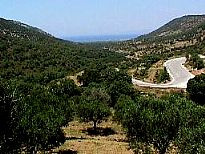 The girls are going to Anna's for lunch. I forsee an afternoon of chatting about the tiles in Pam's bathroom and the dreaded ceramic icons with the cracking paint so I let them know that I plan to venture out alone. Andrea wants to come but there is no way that Pam can bring Amarandi back on her motorbike unless she is sandwiched in between them. I say goodbye in the lower platia of Vatousa and jump into the car. For the next few hours I am free. With half a tank of gas and a pocket full of drachma there's nowhere I can't go with the exception of Erressos or Sigri since that is where Andrea wanted to go. But I head in that direction anyway and turn off the road at the Monistary of the Perivoli, which is a fancy word for garden. I drive down the mountain to a fertile little valley and pull into a big yard outside the walls of the monastery. There is an old man sitting at the gate and he shows me around. He's the caretaker. There are no monks there anymore but I can't understand why. The place is heaven on eart
h with a small chapel and the monks former home enclosed by a big wall. Also within the wall is a beautiful garden that has been kept up. The old man gives me the grande tour of the church which is painted from top to bottom with murals that are now faded and difficult to see. He carefullly points out each scene and explains the significance of which I understand about half of. I'm more interested in him. Is this his job? Can I take his place when he retires? There is a big panagiri on November twenty-firstwhen the church and the yard outside it's walls fill with people. As I am leaving I wonder if it's customary to tip in this situation. I don't want to take the chance of insulting him by asking but I leave two hundred drachs on the bench where he had been sitting when I drove up. If he doesn't realize it's from me maybe he will think it's from God.
The girls are going to Anna's for lunch. I forsee an afternoon of chatting about the tiles in Pam's bathroom and the dreaded ceramic icons with the cracking paint so I let them know that I plan to venture out alone. Andrea wants to come but there is no way that Pam can bring Amarandi back on her motorbike unless she is sandwiched in between them. I say goodbye in the lower platia of Vatousa and jump into the car. For the next few hours I am free. With half a tank of gas and a pocket full of drachma there's nowhere I can't go with the exception of Erressos or Sigri since that is where Andrea wanted to go. But I head in that direction anyway and turn off the road at the Monistary of the Perivoli, which is a fancy word for garden. I drive down the mountain to a fertile little valley and pull into a big yard outside the walls of the monastery. There is an old man sitting at the gate and he shows me around. He's the caretaker. There are no monks there anymore but I can't understand why. The place is heaven on eart
h with a small chapel and the monks former home enclosed by a big wall. Also within the wall is a beautiful garden that has been kept up. The old man gives me the grande tour of the church which is painted from top to bottom with murals that are now faded and difficult to see. He carefullly points out each scene and explains the significance of which I understand about half of. I'm more interested in him. Is this his job? Can I take his place when he retires? There is a big panagiri on November twenty-firstwhen the church and the yard outside it's walls fill with people. As I am leaving I wonder if it's customary to tip in this situation. I don't want to take the chance of insulting him by asking but I leave two hundred drachs on the bench where he had been sitting when I drove up. If he doesn't realize it's from me maybe he will think it's from God.
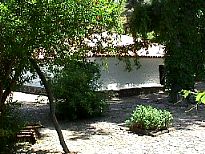 There is a dirt road that runs parallel to the beach in the fertile valley of Campo Antissa. Where it connects with the paved riverbed that serves as the road to the beach are two small tavernas, both shaded by grape vines and fruit and nut trees. It was last summer that we came to this quiet place and ate the best grilled sardines of our lives. As we ate, the restaurant gradually filled up with Greek/Americans who were returning to their village for the summer, though it's not really a village, but a collection of small farms. Now in mid-September they have all gone home. In the restaurant across the street the only customer is the man who delivers the Tsekeli Brand Ouzo while I am the lone customer here. This could be the quietest spot on earth. But it's not. Because of the elections, televisions in both restaurants are on full blast as candidates try to get their points across to an audience they can't see. Occasionally I hear the tweet of a bird, in the short silence between one important point and the ne
xt. The comercials are full of patriotic music and slogans about the future and destiny of a country that wants desperately to be a part of Europe but is probably better off as the leader of a united Balkans.
There is a dirt road that runs parallel to the beach in the fertile valley of Campo Antissa. Where it connects with the paved riverbed that serves as the road to the beach are two small tavernas, both shaded by grape vines and fruit and nut trees. It was last summer that we came to this quiet place and ate the best grilled sardines of our lives. As we ate, the restaurant gradually filled up with Greek/Americans who were returning to their village for the summer, though it's not really a village, but a collection of small farms. Now in mid-September they have all gone home. In the restaurant across the street the only customer is the man who delivers the Tsekeli Brand Ouzo while I am the lone customer here. This could be the quietest spot on earth. But it's not. Because of the elections, televisions in both restaurants are on full blast as candidates try to get their points across to an audience they can't see. Occasionally I hear the tweet of a bird, in the short silence between one important point and the ne
xt. The comercials are full of patriotic music and slogans about the future and destiny of a country that wants desperately to be a part of Europe but is probably better off as the leader of a united Balkans.
I ask the woman who is glued to her television if she has sardines. She nods her head which unfortunately in Greece means no. She does have salpa and tomato salad and rather then insult her by leaving I order one, not knowing if it's the size of an anchovy or a marlin. It sounds like there is more action across they way and I momentarily regret my weakness and wish I had gone there instead, especially because she acts as if I have interrupted her while doing something important, but by the time the fish comes she is friendly and all smiles. Plus the fish is delicious and the perfect meal for me and her cat. I ask if she remembers me and she says she does but I can tell she thinks I am someone else when she asks me how things are at the gas station. At least she thinks I am Greek which is a compliment to my ability to order food. I finish my fish and I am happy. Satisfied with my meal and feeling that by eating here I have done some kind of research since we were planning on coming back here tonight for a dinn
er of grilled sardines and now I know they don't have any.
I hear thunder approaching and get up to pay. I'm a little apprehensive about the cost of the fish but she only charges me a thousand drachs for the entire meal, less then four dollars. I thank her and get her phone number so we can call and ask if they have sardines. Her son Kosta, remembers me from last year, especially when I tell him that he had made the best grilled sardines not only on the island, but in the whole world. "Ah, now I remember you," he laughs, remembering our sardine orgy of last summer. "Call us", he says. "For sure we will have some this week."
It's music to my ears.
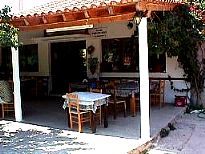 With the first few drops of rain falling I drive down the paved ravine to the beach. I don't want to stay long because in an hour the road could be a river as the water pours down the mountains and empties into this channel to the sea. I stop by the shack of the old man who rented rooms to us last year. He's trying to sell some land around it along with the building itself which he has been running unsuccesfully as a beach ouzerie-cafeneon. To me it looks like paradise and I wonder if he's raised his price since last year. I invision a tiny music-cafeneon, serving wine, beer, ouzo and snacks cooked by my mother and mother-in-law, while every night I entertain the customers, singing my songs while occasionally bringing in a special guest star. I imagine this really hip folk club in the most remote beach on the island, where sea meets swamp, music echoing through the reeds and across the sea to the coast of Turkey. A few posters scattered around and it could be the hottest spot in Lesvos. And there's plenty of
free parking.
With the first few drops of rain falling I drive down the paved ravine to the beach. I don't want to stay long because in an hour the road could be a river as the water pours down the mountains and empties into this channel to the sea. I stop by the shack of the old man who rented rooms to us last year. He's trying to sell some land around it along with the building itself which he has been running unsuccesfully as a beach ouzerie-cafeneon. To me it looks like paradise and I wonder if he's raised his price since last year. I invision a tiny music-cafeneon, serving wine, beer, ouzo and snacks cooked by my mother and mother-in-law, while every night I entertain the customers, singing my songs while occasionally bringing in a special guest star. I imagine this really hip folk club in the most remote beach on the island, where sea meets swamp, music echoing through the reeds and across the sea to the coast of Turkey. A few posters scattered around and it could be the hottest spot in Lesvos. And there's plenty of
free parking.
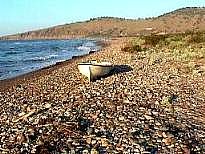 I walk down to the beach where the drops are beginning to show on the water and the coast of Turkey is fading into the mist. I can't really tell which way the clouds are moving but it looks like it must be raining like hell in Vatoussa. I wonder how the girls wll get back to Xidera. There is a fisherman's net stretching out from the beach in a zig-zag pattern about fifty meters off shore. I walk over to the pond that has formed where the riverbed ends and the beach begins. As I walk along the shore hundreds of tiny frogs jump into the water. I assume they are frogs. I never actually see anything except the continuous little splashes as I pass. A fisherman drives up in a pick-up truck and drags his rowboat furthur from the water and then to make sure, ties it to a pole. He's expecting heavy weather and he's right. In a few minutes it is pouring rain and I'm learning how to work the windshield wipers of the Puegeot. It's not long before I have mastered them and am happily driving to the sea-side village of Gava
tha. The pavement ends abrubtly and the entrance to the village is a sea of mud, but the harbor is very scenic and the fishing boats look lovely in the rain. I watch them for awhile but I can't get the thought of Amarandi, Andrea and Pam driving home through the downpour on her little papaki motorbike, out of my head. The battle between inner-peace and guilt is over quickly and I drive the now hazardous mountain road to Vatoussa where I search in vain for Anna's house. By the time I get back to the car I am as wet as they would be on the motorbike. I drive back to Xidera and spend half an hour looking for a clever place to park the car. I end up in the exact same spot I had so much trouble getting out of the first day. At least now I have experience.
I walk down to the beach where the drops are beginning to show on the water and the coast of Turkey is fading into the mist. I can't really tell which way the clouds are moving but it looks like it must be raining like hell in Vatoussa. I wonder how the girls wll get back to Xidera. There is a fisherman's net stretching out from the beach in a zig-zag pattern about fifty meters off shore. I walk over to the pond that has formed where the riverbed ends and the beach begins. As I walk along the shore hundreds of tiny frogs jump into the water. I assume they are frogs. I never actually see anything except the continuous little splashes as I pass. A fisherman drives up in a pick-up truck and drags his rowboat furthur from the water and then to make sure, ties it to a pole. He's expecting heavy weather and he's right. In a few minutes it is pouring rain and I'm learning how to work the windshield wipers of the Puegeot. It's not long before I have mastered them and am happily driving to the sea-side village of Gava
tha. The pavement ends abrubtly and the entrance to the village is a sea of mud, but the harbor is very scenic and the fishing boats look lovely in the rain. I watch them for awhile but I can't get the thought of Amarandi, Andrea and Pam driving home through the downpour on her little papaki motorbike, out of my head. The battle between inner-peace and guilt is over quickly and I drive the now hazardous mountain road to Vatoussa where I search in vain for Anna's house. By the time I get back to the car I am as wet as they would be on the motorbike. I drive back to Xidera and spend half an hour looking for a clever place to park the car. I end up in the exact same spot I had so much trouble getting out of the first day. At least now I have experience.
The girls arrive at the house five minutes after me, all soaking wet except Amarandi in her lime green waterproof windbreaker. The rain continues to fall until the late afernoon when the sky clears and a rainbow appears. It's Amarandi's first.
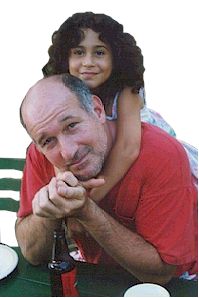 Somehow the rain has knocked out all the streetlights in the village. There is still a faint hue of dark blue in the sky as we leave the house for dinner at Aglaia's and we are able to find our way through the streets. Our first stop is at Thanasis' where Kosta Simitis the leader of Pasok is speaking to a crowd of half a million on the television. Some of the old men are watching but the sound is not on loud enough so that they can hear and they don't seem to mind. Amarandi begins to bark like a dog. We ask her to stop. She continues. It's like she is possessed. Andrea takes her and looks forcefully into her eyes. "Stop this noise right now!" Amarandi keeps barking. We are feeling self-concious because of the men in the cafe but it's also obnoxious and by now I'm concidering the possibiltiy of demonic possession. I want to slap her across the face to snap her out of it but I fight the impulse. I take her hand and squeeze it and say in my sternest voice that she has to stop barking but she doesn't. Finally I t
ake hold of her little face and hold her hard until I have her attention. She gives out one last bark and snaps out of her dog personality with a torrent of tears. She calms down and is herself again. Andrea and I look at each other and wonder "what was that all about?" Perhaps someone gave her the evil eye. The woman who read Andrea's coffee cup told her she had an enemy. "Someone is very jealous of you", she had said.
Somehow the rain has knocked out all the streetlights in the village. There is still a faint hue of dark blue in the sky as we leave the house for dinner at Aglaia's and we are able to find our way through the streets. Our first stop is at Thanasis' where Kosta Simitis the leader of Pasok is speaking to a crowd of half a million on the television. Some of the old men are watching but the sound is not on loud enough so that they can hear and they don't seem to mind. Amarandi begins to bark like a dog. We ask her to stop. She continues. It's like she is possessed. Andrea takes her and looks forcefully into her eyes. "Stop this noise right now!" Amarandi keeps barking. We are feeling self-concious because of the men in the cafe but it's also obnoxious and by now I'm concidering the possibiltiy of demonic possession. I want to slap her across the face to snap her out of it but I fight the impulse. I take her hand and squeeze it and say in my sternest voice that she has to stop barking but she doesn't. Finally I t
ake hold of her little face and hold her hard until I have her attention. She gives out one last bark and snaps out of her dog personality with a torrent of tears. She calms down and is herself again. Andrea and I look at each other and wonder "what was that all about?" Perhaps someone gave her the evil eye. The woman who read Andrea's coffee cup told her she had an enemy. "Someone is very jealous of you", she had said.
After the incident we order a couple ouzos from Thanasis. He serves it with a small Greek salad and some fried potatos with a dab of ketchup. It's a strange meze but Amarandi eats them all and then two more plates full. I ask him what kind of ouzo we are drinking.
"The cheapest" he tells me. I tell him that by the end of the month I want to be able to sit at a table with twenty identical looking glasses of different ouzos, and be able to identify the brand of each one, by taste.
He laughs. "Many people say I like this kind of ouzo or I like that kind, but if I pour Ouzo Kefi into an Ouzo Mini bottle they don't know the difference."
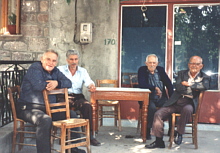 We go across the street to Avglaia's for dinner. It's packed with old men but they make room for us at one of the tables. Everyone greets me. Most of them, if not all by name. Amarandi is fading fast so Andrea sends me to the car for the stroller and the flashlight so we can find our way home. The streets are even darker but I follow the sound of Simitis' voice to the first cafeneon in the square where a handful of men are watching him on the TV attentively. The proprietor waves a greeting to me. From inside someone calls out "Yassoo Matheos". My car is parked between the other two cafes. In one they are watching the Pasok rally. It's full of old men. In the other which is concidered the young men's cafe, they're not. In fact it looks like they are watching MTV. I see a large old man pull himself up from his chair in the old man cafe and walk towards me smiling. It's Andrea's cousin the taxi driver who invites me in for a coffee. I refuse appologetically telling him I have to bring back the stroller because A
marandi is about to fall asleep at Avglaia's. Of course he misunderstands and tells me that the ciggarette store is closed. I try to re-explain but he is already offended and goes back to his seat.
We go across the street to Avglaia's for dinner. It's packed with old men but they make room for us at one of the tables. Everyone greets me. Most of them, if not all by name. Amarandi is fading fast so Andrea sends me to the car for the stroller and the flashlight so we can find our way home. The streets are even darker but I follow the sound of Simitis' voice to the first cafeneon in the square where a handful of men are watching him on the TV attentively. The proprietor waves a greeting to me. From inside someone calls out "Yassoo Matheos". My car is parked between the other two cafes. In one they are watching the Pasok rally. It's full of old men. In the other which is concidered the young men's cafe, they're not. In fact it looks like they are watching MTV. I see a large old man pull himself up from his chair in the old man cafe and walk towards me smiling. It's Andrea's cousin the taxi driver who invites me in for a coffee. I refuse appologetically telling him I have to bring back the stroller because A
marandi is about to fall asleep at Avglaia's. Of course he misunderstands and tells me that the ciggarette store is closed. I try to re-explain but he is already offended and goes back to his seat.
I arrive back at Avglaia's just as my ouzo is being put on the table, along with a nice tomato and rocca salad and a plate of what I thought was sun-dried tomatos, but turns out to be fried calf's liver and spleen dressed in olive oil. I eat it happily. It goes great with ouzo. At first I am uptight about the situation. We are the center of attention and everyone asks us questions, then comment to each other about our answers. Gradually the ouzo begins to warm me up and open me up at the same time. I relax and with some translative help from Pamela, my Greek is sufficient to get my ideas across. Most of the discussion is political. Various parties are represented in the room and they ask me who I would vote for. I tell them I'm for the guy from Boston College. Avglaia starts bringing us fish. After awhile she's like the Sorcerer's Apprentice and we can't keep up with her. After we tell her we have had enough she brings us one more platefull. We send them back and tell her to save it for Amarandi's breakfast t
ommorrow. Amarandi's new thing is to eat the noses off all the fish. Her plate is full of noseless fish heads. Even she finds the pace exhausting and falls asleep in her stroller. Avglaia puts another salad on our plate and offers me another portion of sheep spleen which I turn down. But I do order a beer which compliments the fried fish perfectly. I tell Pam and Andrea that according to Michio Kushi, beer is the perfect balance for fried food. I don't know if it's true but it sounds good. The talk is always about America. One old man tells us that he loves Cuba, hoping to get a response from us and get the communist versus capitalist debate going, but I sidestep it. "My favorite baseball player comes from Cuba!" I tell him exitedly and then explain to Pam how Rey Ordonez had climbed over a wall in Binghamton, New York during an exhibition tour and all the baseball teams took place in a special lottery for his services. "He's the best shortstop in the world!" I tell her, but then I have to explain what a shor
tstop is. Then we are on to defensive shifts, variety of pitches, catcher to pitcher communication and the use of computers to evaluate information on the tendencies of opposing players. Pam is interested but Andrea has found her excuse to go home and read her mystery book. We say goodbye's all around.
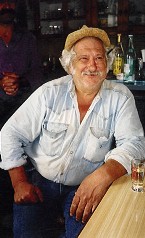 I walk in to Thanasis' to say goodnight but an old man pulls me over to a table he is sharing with a friend and insists I join him for a discussion. He's a communist named Anthymos. He hates America. Not the American people, he makes sure I understand. He believes the American government is on the side of the Turks. I tell him that it is not possible. The Greeks have too much power in America. They have a strong lobby and spend millions. They are in government and more important, they are at the tops of some very powerful corporations. Even if it is strategically better to support the Turks, America could not do it because of public opinion. Americans love the Greeks. He doesn't agree. I can understand. Any communist who witnessed America's role in the Greek Civil War would find it difficult to ever forgive us. When comrades and family have been killed by American guns and money and your future has been snatched unfairly from your grasp, to be able to forgive would take a superhuman effort. To me it is enough
that he holds no grudge against the American people.
I walk in to Thanasis' to say goodnight but an old man pulls me over to a table he is sharing with a friend and insists I join him for a discussion. He's a communist named Anthymos. He hates America. Not the American people, he makes sure I understand. He believes the American government is on the side of the Turks. I tell him that it is not possible. The Greeks have too much power in America. They have a strong lobby and spend millions. They are in government and more important, they are at the tops of some very powerful corporations. Even if it is strategically better to support the Turks, America could not do it because of public opinion. Americans love the Greeks. He doesn't agree. I can understand. Any communist who witnessed America's role in the Greek Civil War would find it difficult to ever forgive us. When comrades and family have been killed by American guns and money and your future has been snatched unfairly from your grasp, to be able to forgive would take a superhuman effort. To me it is enough
that he holds no grudge against the American people.
Thanasis is the translator when something Anthymos says is beyond my range of understanding, but mostly, through repetition and intent he is making himself very clear and he is happy that I am agreeing with almost everything he says. He keeps shaking my hand in the solidarity handshake. He's missing parts of most of his fingers.
Finally it's only Thanasis, Anthymos and myself. All the other old men have gone, and Thanasis yawns, signaling that the evening is over. When Anthymos leaves I say to Thanasis, "You don't know how lucky you are to have this business. Everynight you can have a meaningful conversation with people who talk passionately about what they believe in. You think you are stuck in the middle of nowhere but really you are at the center of the universe. Every night you are a guest in the hearts and minds of men. I am envious of you."
"Maybe", he tells me with a shrug. "But you said something to me that made me very proud. It was when you told of your friends thesis on the Greek/Americans being the most educated and successful of all immigrants in the United States. This is very special."
We say goodnight. He has to wake up at five in the morning to take his wife and mother-in-law to a small church up in the mountains. I walk home but it is so dark I can't see the street. It's like walking with my eyes closed. I take one slow step at a time with my hand out in front to feel the way. I miss the turn and find myself down at the square. I am tempted to go back and borrow a flashlight but instead look up at the stars. By using them I can find the streets by seeing where the total blackness of the rooftops end and the stars begin. I finally find what feels like our gate but until I open the front door of the house and switch on the light, I'm still not totally sure I am in the right place.
There is an ever present tension between Andrea, Pam and their relatives. Pam says it's because the villagers are jealous because their family moved away to America and had easy lives. Then she tells me the real reason. Whenever Andrea's grandparents would come back to Greece to visit from America, they would stay with her cousin Mitsos for anywhere from a month to six weeks. One day her grandfather asked Mitsos why they never ate meat. It was too expensive he was told. "Then I too shall eat beans and rice", he declared, rather then offer to repay his hosts hospitality by buying meat which he could easily afford. But the grandfather was not the problem. It was the notorious Yaya Stasa, Andrea's Grandmother. A twisted version of Robin Hood who stole from the poor to give to the poor in order to appear generous. One day Mitsos could not find his good shoes. He looked everywhere and asked everyone but nobody knew. That evening his cousin from Skalahori came for a visit, proudly wearing Mitsos good shoes. "Where
did you get those shoes?" asked Mitsos.
"Stasa brought them for me from America".